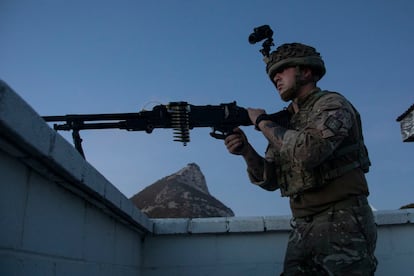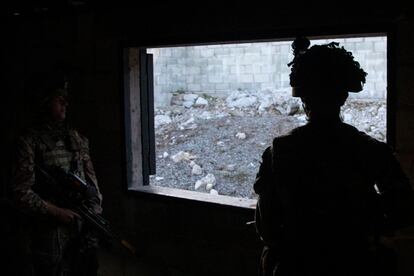British armed forces complete military exercise in Gibraltar’s secret tunnels
The four-day mission in The Rock’s vast underground network was aimed at testing soldiers’ ability to fight in “complete darkness”

A subterranean city is hidden under the Rock of Gibraltar. Tourists to the British Overseas Territory, located on the southern coast of the Iberian peninsula, can take a tour of this network of underground tunnels. But what they see is just a fraction of the vast space, which is made up of 50 kilometers of tunnels wide enough to shelter 16,000 soldiers from an attack and with enough resources to hold out for 16 months. Most of the military facility was built during the Second World War and has largely been left unused. But on Sunday, the British armed forces completed a four-day military exercise in these secret tunnels.
Dubbed Macaque Malice, the exercise was led by the I Company of the Royal Gibraltar Regiment in an effort to test “offensive actions in Gibraltar,” the British armed forces explained in a press release on Sunday. The participating soldiers used the tunnels, which belong to the Defense Ministry, to simulate “a series of attacks” in subterranean operations.
The exercise has been the culmination of a month of training aimed at reviewing the company’s basic military skills for offensive operations. More than 100 soldiers who make up the unit took part in patrols and simulated attacks around Gibraltar in a bid to assess their ability to reach remote places using a combination of military transportation and foot patrols. The exercise in the tunnels was aimed at testing soldiers’ ability to work in “complete darkness.”

“We are innovating the way we conduct some of our operations in Gibraltar,” said Commander José García White, the official in charge of I Company. The idea, according to White, is to continue exercises in the next months with off-road driving training in the United Kingdom and courses for the medical team.
The I Company of the Royal Gibraltar Regiment, formerly known as G Company, is a unit of between 100 and 150 soldiers of the British armed forces based in Gibraltar. Its role as a light infantry company is to protect key military assets in the territory. In addition to this task, soldiers from the regiment are often deployed abroad for operations and training. Now that the exercise has come to an end, the company has returned to its daily tasks, which include protecting The Convent, the official residence of the governor of Gibraltar.
The Exercise Macaque Malice was not the first to be carried out in the tunnels of ‘The Rock,’ as the territory is known. Indeed, these facilities are regularly used for anti-terrorist military training in close contact, both by soldiers in Gibraltar and those deployed from the United Kingdom. The first stage of the tunnel network was built during the Great Siege of Gibraltar, when Spanish and French troops attacked the territory between 1779 and 1783.
It was during this time that soldiers discovered that instead of building tunnels to place cannon on the furthest parts of The Rock, they could excavate a network of them to defend the city. During the Second World War, the tunnel network was extended, as the territory was considered to be strategically positioned in an allied zone, against Italy and Germany. The underground space was increased to include space for 16,000 soldiers with everything they would need to survive for 16 months. Today, the subterranean city is still home to a telephone station, power generation station, hospital, bakery, stockpiles of ammunition and even a workshop to repair cars.
English version by Melissa Kitson.
Tu suscripción se está usando en otro dispositivo
¿Quieres añadir otro usuario a tu suscripción?
Si continúas leyendo en este dispositivo, no se podrá leer en el otro.
FlechaTu suscripción se está usando en otro dispositivo y solo puedes acceder a EL PAÍS desde un dispositivo a la vez.
Si quieres compartir tu cuenta, cambia tu suscripción a la modalidad Premium, así podrás añadir otro usuario. Cada uno accederá con su propia cuenta de email, lo que os permitirá personalizar vuestra experiencia en EL PAÍS.
¿Tienes una suscripción de empresa? Accede aquí para contratar más cuentas.
En el caso de no saber quién está usando tu cuenta, te recomendamos cambiar tu contraseña aquí.
Si decides continuar compartiendo tu cuenta, este mensaje se mostrará en tu dispositivo y en el de la otra persona que está usando tu cuenta de forma indefinida, afectando a tu experiencia de lectura. Puedes consultar aquí los términos y condiciones de la suscripción digital.









































